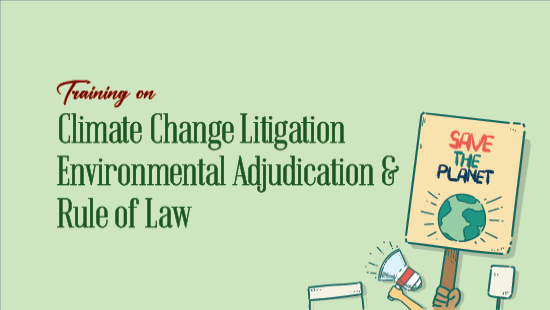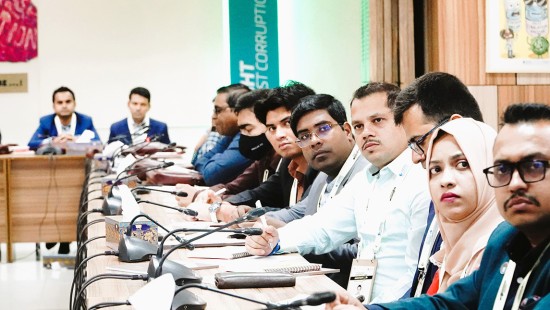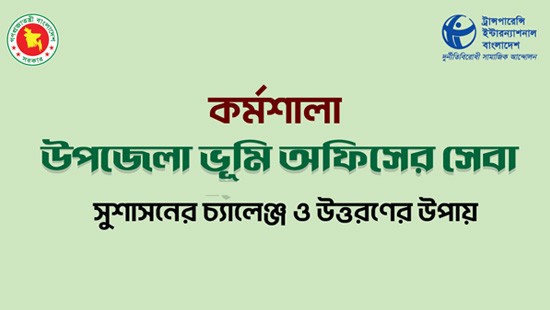Published: 27 October 2025
Aishath Alsan Sadiq of the Maldives leaned forward in a conference room in Dhaka, her gaze fixed on the screen showing the methodology for the corruption survey. Thousands of miles from her island nation, she was learning something that would reshape how her organization fights corruption back home. "I came in with many expectations," she would later say, and the three days ahead would exceed every one of them.
This was no ordinary workshop. Seven chapters of Transparency International (TI) came together in Dhaka from October 21 to 23, 2025, for an exclusive collaboration that aims to transform the approach of these countries to the enduring issue of corruption through the utilization of data.
The Power of Numbers
Corruption does not respect borders. Whether it is a bribe demanded at a passport office in Colombo/Dhaka, irregular land dealings in Jakarta/Kathmandu, or questionable police encounters in Karachi, the pattern repeats itself across continents. But what if there was a way to capture these scattered experiences, quantify them, and transform complaints into solid evidence? That is precisely what brought together the executive directors, board members, program coordinators, and researchers from Sri Lanka, Fiji, Indonesia, Maldives, Nepal, Pakistan, and Malaysia to the office of Transparency International Bangladesh (TIB). Jointly organized by the TI Secretariat and TIB, with funding from the European Union, the "Corruption Survey Workshop: Data Skills for Anti-Corruption Research & Advocacy" had offered to turn participants into data warriors.
Why Data Matters Now More Than Ever
The workshop focused on hands-on, applicable strategies, with experts leading sessions that linked theoretical methods to practical outcomes. Dr. Gabriela Camacho Garland and Maria Constanza Castro, from TI's Research Development team, helped participants understand the Global Corruption Barometer and National Household Surveys, which are important tools for turning people's experiences into effective advocacy resources.
Professor Syed Shahadat Hussain from Dhaka University and TIB's Research Director Muhammad Badiuzzaman explained the details of how surveys are done, while TIB Senior Research Fellow Shahazada M. Akram shared important lessons about the difficulties faced during fieldwork, which come from working closely with communities and tackling tough questions. In addition, there was the session on sector-wise corruption analysis, corruption types, bribery drivers, and burden analysis by Mohammad Abdul Hannan Shakhider and TIB Research Fellow Nure Alam Milton.
The first session on the final day of the workshop provided participants with extensive knowledge, covering topics such as analyzing corruption in specific sectors, understanding bribery trends, breaking down data, and visualizing it using Power BI. Led by TIB's Outreach and Communication Director, Muhammad Tauhidul Islam, along with his data visualization team, Rifat Rahman and K.M. Rafiqul Alam, the session emphasized that data collection is not just about numbers; it is about telling stories that lawmakers can relate to and making strong evidence that leads to real change.
What made this gathering in Dhaka particularly significant was the spirit of mutual exchange. Transparency International Bangladesh (TIB) has been conducting the National Household Survey, which is a rigorous, evidence-based approach to measuring corruption, and other chapters came to learn from TIB while sharing their experiences. "TIB has been working as a champion of anti-corruption in Bangladesh over the years," noted TIB Executive Director Dr. Iftekharuzzaman. He thanked the TI Secretariat and participants for joining, emphasizing that "It is a mutually learning workshop for all of us. Therefore, we would like to see many more of these. Such workshops have immense value, as they create direct interactions among chapters, giving scope for experience sharing and learning."
Dr. Gabriela Camacho Garland echoed this statement, "With this workshop, other chapters got to share their experiences and learn, giving them expertise to implement these ideas in their own countries."
Maria Constanza Castro articulated the workshop's core purpose with clarity, "We TI chapters gathered here today to understand how we can measure corruption through the perceptions and experiences of normal citizens." In an era of misinformation and competing narratives, evidence-based advocacy cuts through the noise. Demonstrating that 60% of citizens in a particular district paid bribes to access basic services, or that corruption costs the average household a measurable percentage of their income, transforms the conversation from opinion to action. Castro underscored the importance of data-driven advocacy for the anti-corruption movement. "In order to provide compelling evidence for our advocacy, we are delighted to invest in the capabilities of our movement."
Transforming Perspectives
For many participants, the workshop clarified their assumptions about what it takes to conduct credible corruption surveys.
Ulaiasi Waqaitanoa Tuikoro, a board member from CLCT Integrity Fiji, arrived thinking his small island nation could conduct a corruption survey relatively quickly. After all, how complicated could it be? There was a significant shift in his perspective three days later, after the workshop had been finished. "The workshop can be summed up as very informative, motivating, and inspiring," he reflected. "It might seem that small countries could conduct a corruption survey within a short period, but after getting to know about the survey, I realized that it requires expert involvement to ensure that the data is valid." His revelation speaks to a larger truth that fighting corruption isn't just about good intentions; it's about methodological rigor, statistical validity, and the painstaking work of turning individual experiences into collective evidence. Even in Fiji, where corruption might not grab headlines, Tuikoro saw opportunity. "Despite Fiji not being known much for corruption, we can still try to improve the country's position in the CPI ranking."
Aishath Alsan Sadiq, Senior Project Coordinator of Transparency Maldives, came with clear goals. "I came in with many expectations. I wanted to understand how corruption survey-related data is collected and the technical aspects of it. I believe these will allow us, as a chapter, to conduct more surveys in the future. The overall workshop was indeed insightful.
The Road Ahead
As the three-day workshop concluded, Prof. Dr. Sumaiya Khair, TIB's Adviser for Executive Management, reminded participants that every context brings unique value. "No two contexts are the same. What is happening in Bangladesh today, you might as well face next year or so," she noted, acknowledging both the challenges and opportunities facing the anti-corruption movement globally. Her assurance was simple but powerful: "We are always here to extend our help to any of the TI chapters."
A Strengthened Movement
Back in the Maldives, Aishath Alsan Sadiq will return with more than just expectations met. She carries home the technical knowledge to conduct rigorous surveys, the methodological framework to ensure data validity, and perhaps most importantly the confidence that comes from learning alongside peers facing similar battles.
In Fiji, Ulaiasi Tuikoro will approach his nation's corruption challenges with new understanding, realizing that improving CPI rankings is not about perception management; it is about methodological excellence and genuine reform.
Across Sri Lanka, Indonesia, Nepal, Pakistan, and Malaysia, the ripple effects of this workshop will manifest in more robust surveys, more credible data, and more powerful advocacy. When these chapters publish their next corruption reports, the numbers will carry the weight of international best practices and peer-reviewed methodology.
At the closing session, ED TIB, Dr. Iftekharuzzaman stated that "this workshop was not just about transferring skills; it was about building a network of evidence-based warriors united in a common cause, sharing tools, tactics, and solidarity to stop corruption. Corruption may not respect borders, but neither does the movement to fight it." He also thanked the TI Secretariat and the participants for joining the workshop. “We expect this initiative to continue, and this is not the end!"




















